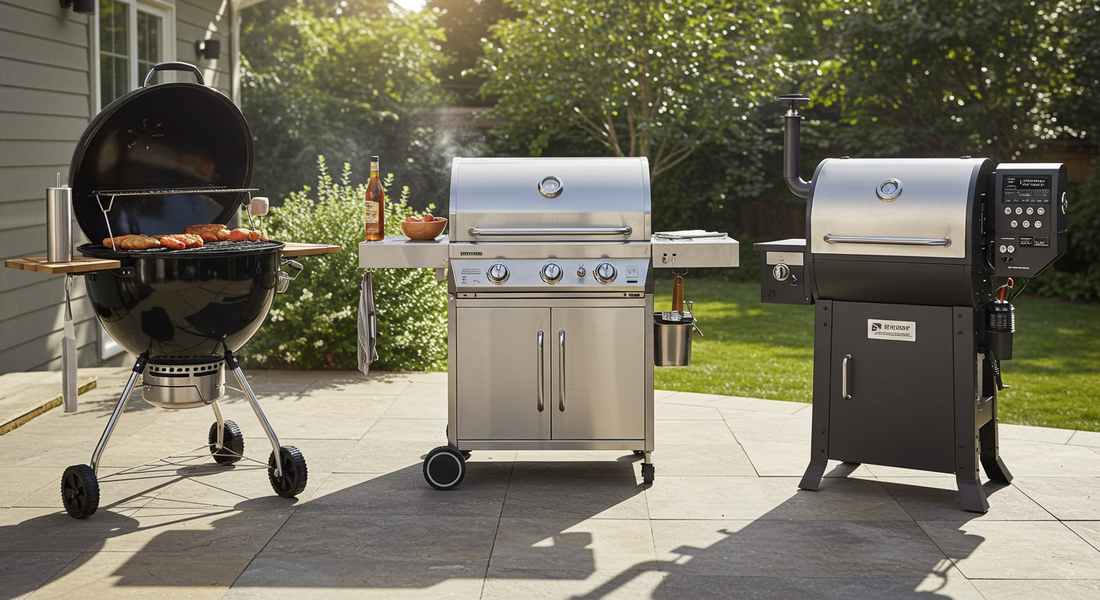
A Beginner's Guide to Grills: Charcoal vs. Gas vs. Pellet
Share
Welcome to the wonderful world of outdoor cooking! There's something truly special about firing up a grill in your own backyard, hearing that sizzle, and sharing a delicious meal with family and friends. Choosing the right grill is your first step to becoming the undisputed hero of your backyard BBQ. It's not just an appliance; it's a passport to flavor, fun, and unforgettable memories.
But with so many options, where do you start? This guide will break down the three main fuel types—charcoal, gas, and pellet—to help you figure out how to choose a grill that’s perfect for you.
The Great Debate: Flavor vs. Convenience
The choice between grill types really comes down to what you value most: the authentic, smoky flavor of charcoal, the push-button convenience of gas, or the versatile, tech-savvy nature of pellet grills.
A. Charcoal Grills: The Flavor Purist's Choice
-
Pros: Charcoal grills are masters of flavor. They can reach incredibly high temperatures for a perfect sear and impart that classic, smoky taste that many BBQ enthusiasts crave. They are also typically less expensive upfront.
-
Cons: There's a definite learning curve. Managing the heat requires practice, and the entire process, from lighting the coals to cleaning up the ash, is more time-consuming and messy.
B. Gas Grills: The King of Convenience
-
Pros: The biggest advantage of a gas grill is its ease of use. With the push of a button and the turn of a knob, you have instant, controllable heat. This makes them perfect for quick weeknight dinners and hassle-free entertaining. Cleanup is also a breeze.
-
Cons: The main drawback is that they don't produce the same deep, smoky flavor as charcoal. While some models have "smoker boxes," they can't fully replicate that authentic taste.
C. Pellet Grills: The Tech-Savvy Smoker
-
Pros: A pellet smoker grill is the ultimate "set-it-and-forget-it" machine. You fill a hopper with wood pellets, set the digital controller to your desired temperature, and it does the rest, maintaining a precise temperature for hours. This makes them incredible for smoking meats like brisket and ribs, but they can also grill and bake.
-
Cons: They are the most expensive option and require electricity to run, which limits their portability.

Key Features for First-Time Buyers
When you're shopping for the best beginner grill, don't get overwhelmed. Focus on these key features:
-
Cooking Surface Area: Think in terms of burgers. How many people are you typically cooking for? A small grill might fit 10-15 burgers, while a large one can handle 25 or more. Choose a size that fits your lifestyle.
-
Build Quality and Materials: Look for a grill that feels sturdy, not flimsy. The grates are especially important. Cast iron grates hold heat incredibly well and create amazing sear marks, while stainless steel grates are durable and easier to clean.
-
Essential Accessories: At a minimum, your grill should have a built-in thermometer. You'll also want to budget for a good grill cover to protect your investment, a basic set of tools (tongs, spatula), and a grill brush for cleaning.
Our Pick for the Weekend Grillmaster
So, what's our top recommendation? For most beginners who want to start grilling without a steep learning curve, the gas grill is the perfect starting point. The charcoal vs gas grill debate is a classic, but the convenience and control of gas make it much more approachable and likely to be used regularly.
What to look for in a quality gas grill:
-
At least two burners for temperature control and indirect cooking.
-
A sturdy, well-built frame and lid.
-
Grates made from cast iron or heavy-gauge stainless steel.

Conclusion: Firing Up Your Passion for Grilling
Choosing your first grill is an exciting step. By considering your priorities—flavor, convenience, or versatility—you can find the perfect match to kickstart your passion for outdoor cooking. Don't be afraid to start simple, learn the basics, and enjoy the process. Happy grilling!
